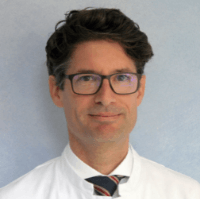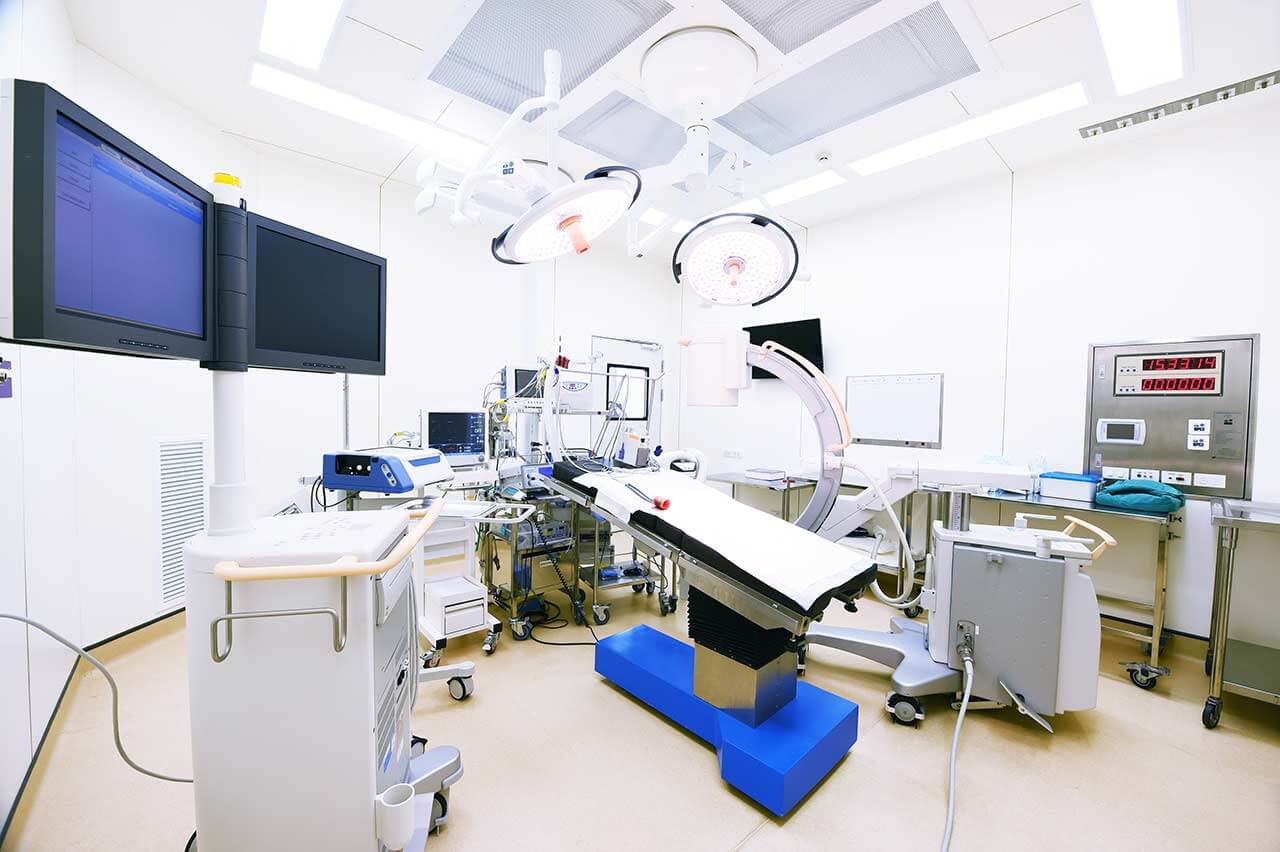
The program includes:
- Initial presentation in the clinic
- clinical history taking
- review of medical records
- physical examination
- laboratory tests:
- complete blood count
- general urine analysis
- biochemical analysis of blood
- TSH-basal, fT3, fT4
- tumor markers
- inflammation indicators
- indicators of blood coagulation
- orbital ultrasound scan
- CT/MRI/X-ray scan of the head and orbit
- radiation therapy
- nursing services
- consultations of related specialists
- explanation of individual treatment plan
How program is carried out
During the first visit, the doctor will conduct a clinical examination and go through the results of previous laboratory tests and instrumental examinations. After that, you will undergo an additional examination, including complete blood count, laboratory assessment of liver and kidney function. Based on the received results, the physician will conduct radiotherapy planning with the help of CT or MRI, make the permanent tattoo marks on the skin and conduct CT simulation in order to assess the accuracy of the rays and the radiation dose. If necessary, related medical specialists will be involved in the elaboration of a treatment regimen (tumor board).
Radiation therapy is carried out as the day hospital procedure, without mandatory admission to the hospital. At each visit, the physician will assess your general condition and the marks on the skin. After that, you will be placed in a shielded radiation therapy room, on a special table.
Each radiation therapy session lasts less than half an hour (including preparation). All this time, doctors and nurses are monitoring your condition, you can communicate with them through a loudspeaker. The procedure is completely painless. Depending on the planned course of treatment, you will visit the hospital from 1 to 3-5 times a week.
After the completion of the radiation therapy course, you will undergo control examinations aimed at assessing your condition and efficacy of treatment. After that you will receive the medical report with detailed recommendations regarding further follow-up and treatment. In the future, you will be able to have a distant consultation with your attending physician and schedule the next course of treatment, if necessary.
Required documents
- Medical records
- MRI/CT scan (not older than 3 months)
- Biopsy results (if available)
Service
You may also book:
 BookingHealth Price from:
BookingHealth Price from:
About the department
The Department of Adult and Pediatric Diagnostic Radiology, Interventional Radiology, Neuroradiology and Radiation Therapy at the University Hospital Bonn offers the full range of services in these medical fields. The competent doctors of the department work with the state-of-the-art systems for CT, MRI, x-ray, ultrasound, angiography, fluoroscopy and other imaging studies in adults and children. In addition, the department specializes in all modern types of radiation therapy and interventional procedures for the treatment of vascular and oncological diseases. The department is headed by Prof. Dr. med. Daniel Thomas.
The service range of the department includes:
Diagnostic radiology
- Conventional X-ray examinations
- Contrast-enhanced ultrasound examinations
- Fluoroscopy
- X-ray examinations of the breast and abdominal organs
- Tomographic radiographic studies of the musculoskeletal system
- Computed tomography (CT)
- Cardiac CT
- Coronary CT angiography with the determination of calcium levels
- Virtual CT colonoscopy
- Magnetic resonance imaging (MRI)
- Ultrasound examinations (for examining abdominal organs, neck (including thyroid), breast, heart and blood vessels)
- Contrast-enhanced ultrasound examinations
- Combined ultrasound with CT and MRI
- Angiography (imaging of veins and arteries)
- Other diagnostic examinations
Pediatric radiology (specially adapted studies with minimal radiation)
- Ultrasound examinations
- X-ray examinations
- Fluoroscopy
- Magnetic resonance imaging
Interventional radiology
- Angiographic interventions
- Aortic aneurysm correction
- Embolization of vessels of various localizations (procedure for closing the lumen of the vessels)
- Uterine artery embolization for the treatment of uterine myomas
- Intrahepatic portosystemic shunting
- Therapy of vascular occlusions and stenosis (for example, in stroke, obliterating atherosclerosis of the peripheral arteries)
- Cava filter placement
- Miniport implantation
- Prostate artery embolization for the treatment of benign prostatic hyperplasia
- Selective internal radiation therapy for the treatment of liver tumors and metastases
- Transarterial chemoembolization for the treatment of liver tumors and metastases
- Lymphography
- Interventions on the lymphatic vessels (for example, in lymphatic fistulas, lymphocele)
- CT-guided interventional procedures
- Drainage installation (elimination of fluid accumulation)
- Tissue sampling for histological examination (CT-guided biopsy, puncture)
- Targeted injections of drugs
- MRI-guided interventional procedures
- Tissue sampling for histological examination (MRI-guided biopsy, puncture)
- Preoperative tumor marking
- MRI-guided prostate tissue sampling for histological examination
- Other interventional procedures
- Percutaneous transhepatic cholangiography and percutaneous transhepatic cholangiodrainage
- Implantation of nutrient probes in the stomach
- Lacrimal duct reconstruction (dacryocystoplasty)
- CT-guided radiofrequency ablation
- Other interventional procedures
Neuroradiology
- CT of the central and peripheral nervous system
- MRI of the central and peripheral nervous system
- Neuroradiological interventions
- Coiling for aneurysm treatment
- Installation of intracranial stents
- Stenting of the brachiocephalic arteries (carotid, vertebral, subclavian artery)
- Stenting in venous stenosis
- Embolization in arteriovenous malformations and dural fistulas
- Mechanical recanalization and intra-arterial thrombolytic therapy for intracranial vascular occlusions
- Preoperative embolization of vascularized tumors in the head, neck and spine
- Wada test
- Vascular lumen closure (embolization)
- Periradicular and pain therapy for back pain
- Ultrasound examinations
- Myelography
- Other services
Radiation therapy
- Classical radiation therapy with the use of linear accelerators
- Tomotherapy (available only in several medical institutions in Germany). It is most commonly used to treat tumors of the prostate, ear, nose, and throat, some lung tumors, brain and spinal cord tumors
- Other services
Photo of the doctor: (c) Universitätsklinikum Bonn
About hospital
According to the authoritative Focus magazine, the University Hospital Bonn ranks among the top ten medical facilities in Germany!
The hospital was opened on January 1, 2001, although in fact it inherits the medical facility, which operated at the Faculty of Medicine of the University of Bonn. The hospital in Germany combines all the highest standards of modern university medicine of the international level. A highly competent team of experienced physicians, which consists of more than 8,000 employees from various fields, takes care of the patients’ health.
The hospital has 32 specialized departments and 23 institutes, which implement the highest standards of treatment in Germany. On their basis, in addition to the successful clinical activities, the productive research and training of young specialists are carried out. Also, the hospital has 10 intensive care units and more than 30 cutting-edge operating rooms. They are equipped with the advanced surgical, navigation and monitoring systems, which provide sparing and the most effective surgical treatment. The total number of places for hospitalization is 1,250 beds.
The hospital presents all fields of medicine, while many of them are awarded by prestigious German and international certificates. For example, in 2007, the Comprehensive Cancer Center of the hospital became one of the four winners at the nationwide competition among Cancer Centers of Excellence. The research focuses primarily on the clinical genetics and genetic epidemiology, neurology, immunology and infectiology, hepatology and gastroenterology, and diseases of the cardiovascular system. The research findings contribute to the development of new therapeutic methods and overall improvement of treatment in Germany.
The main value for all employees of the hospital in Germany is human health, his individual needs and wishes, therefore, despite the high-tech infrastructure, the focus remains on the human attitude and respect for each patient.
Photo: (с) depositphotos
Accommodation in hospital
Patients rooms
The patients of the University Hospital Bonn live in cozy single, double and triple rooms, designed in bright colors. The standard room furnishing includes a comfortable bed with a remote control, a bedside table, a wardrobe, a table and chairs, as well as a TV and a telephone. Each patient room is equipped with an ensuite bathroom with toilet and shower. The hospital also provides enhanced-comfort rooms.
Meals and Menus
The patients of the hospital are offered tasty and balanced three meals a day: breakfast, lunch and dinner. Every day each meal features three different menus, including a vegetarian one. If you for some reason do not eat all the food, you will be offered an individual menu. Please inform the medical staff about your dietary preferences prior to the treatment.
Further details
Standard rooms include:
Religion
Christian priests are available for the patients at any time. Representatives of other religions may be requested at any time.
Accompanying person
Your companion may stay with you in your room or at a hotel of your choice during the fixed program.
Hotel
You may stay at the hotel during the outpatient program. Our employees will support you for selecting the best option.
The hospital offers a full range of laboratory tests (general, hormonal, tests for infections, antibodies, tumor markers, etc.), genetic tests, various modifications of ultrasound scans, CT scans, MRI and PET / CT, angiography, myelography, biopsy and other examinations. Treatment with medications, endoscopic and robotic operations, stereotaxic interventions is carried out here, modern types of radiation therapy are also used. The hospital offers patients all the necessary therapeutic techniques.
- Surgical treatment of the brain tumors, tumors of spinal cord and spine
- Replacement of all joints, resection arthroplasty
- Deep brain stimulation and vagus nerve stimulation in patients with epilepsy
- Multimodal complex treatment of Parkinson disease
- Thoracic endovascular aortic repair (TEVAR)
These are benign and malignant breast pathologies, malignant tumors of various localizations, neuromuscular diseases, stroke, retinal pathologies and various visual impairments, infertility, autoimmune diseases, epilepsy, coronary artery disease and myocardial infarction, leukemia and other pathologies.
- Ophthalmology
- Epileptology
- Reproductive medicine
- Hematology and oncology
- Neurosurgery
Over 8,000 highly qualified doctors and other employees work at the hospital.





